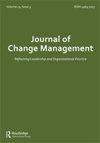The Roles of Sensegiving Language and Context in Change Announcement Acceptance
IF 3
Q2 MANAGEMENT
引用次数: 0
Abstract
ABSTRACT Do leaders use sensegiving language in organization-wide planned change announcements? Does sensegiving language prompt organizational support? What contextual factors influence the reception of change announcements? These questions were explored in an analysis of written reorganization announcements across three executive administrations within a university. We found that sensegiving language was used when the reorganization decision was discretionary and when it was inconsistent with the values of shared governance and campus autonomy. Sensegiving language was associated with acceptance of the announcements but only when it was appropriate for the organizational setting. Leadership style appeared to influence internal support independent of language. Our findings suggest that although discursive ability might allow leaders to craft persuasive statements, the delivery of a change message must be consonant with contextual elements that include culture, external environment, organizational atmosphere, and leadership style. MAD statement When leaders announce a major organizational change, they must build support for the decision by using language that convinces organizational members to commit to successful change implementation. Despite numerous models of change management, there is little research that identifies what language is most effective to do so. This study analysed three university reorganization announcements and found that executives received support for decisions when they used language that was congruent with organizational values and their leadership style. Ideal content by itself was not sufficient to inspire support, nor was it necessary when a planned change was in reaction to the environment.语义语言和语境在变更公告接受中的作用
在组织范围内的计划变更公告中,领导者是否使用赋予意义的语言?赋予意义的语言能促进组织支持吗?哪些环境因素影响变更公告的接受?在对一所大学内三个行政部门的书面重组公告的分析中,对这些问题进行了探讨。我们发现,当重组决策是自由裁量的,并且与共享治理和校园自治的价值观不一致时,就会使用赋予意义的语言。有意义的语言与公告的接受程度有关,但只有当它适合于组织环境时才会如此。领导风格对内部支持的影响与语言无关。我们的研究结果表明,尽管话语能力可能使领导者能够制作有说服力的陈述,但变革信息的传递必须与包括文化、外部环境、组织氛围和领导风格在内的语境要素保持一致。当领导者宣布一项重大的组织变革时,他们必须通过使用说服组织成员致力于成功实施变革的语言来建立对该决策的支持。尽管有许多变革管理模型,但很少有研究确定哪种语言最有效。本研究分析了三所大学的重组公告,发现当高管们使用与组织价值观和领导风格一致的语言时,他们的决策得到了支持。理想的内容本身不足以激发支持,当计划的变化是对环境的反应时,也不是必要的。
本文章由计算机程序翻译,如有差异,请以英文原文为准。
求助全文
约1分钟内获得全文
求助全文
来源期刊

JOURNAL OF CHANGE MANAGEMENT
MANAGEMENT-
CiteScore
6.60
自引率
20.00%
发文量
14
期刊介绍:
Journal of Change Management is a multidisciplinary and international forum for critical, mainstream and alternative contributions - focusing as much on psychology, ethics, culture and behaviour as on structure and process. JCM is a platform for open and challenging dialogue and a thorough critique of established as well as alternative practices. JCM is aiming to provide all authors with a first decision within six weeks of submission.
 求助内容:
求助内容: 应助结果提醒方式:
应助结果提醒方式:


